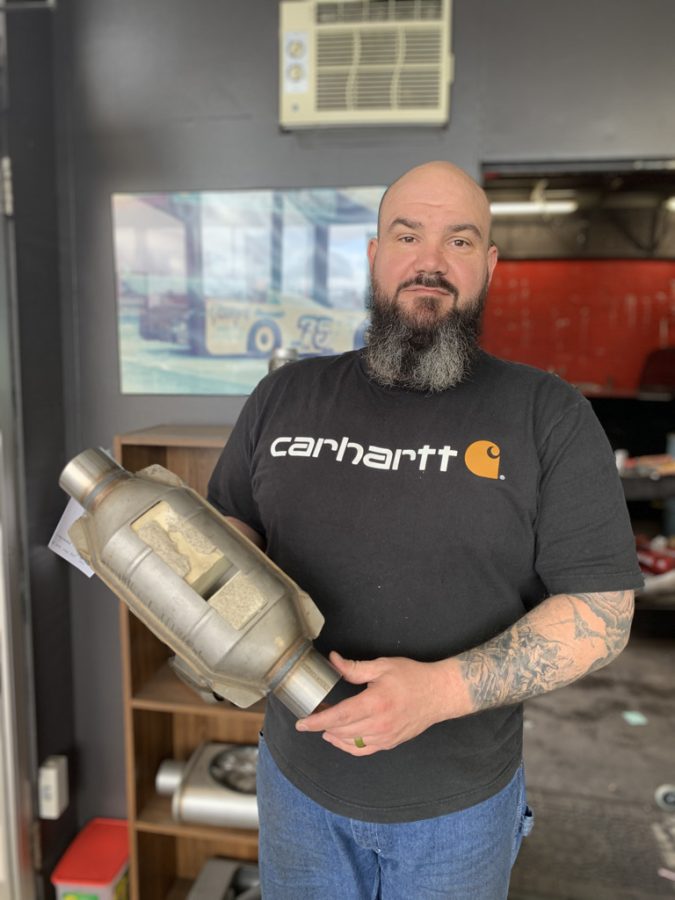Here’s the Tea: What you need to know if your catalytic converter is stolen
Owner of Jerry’s Precision Muffler in Corvallis, Ore., Donald Jackson, holds a display catalytic converter in his shop. Jackson saw an increase in catalytic converter theft beginning in mid-2020.
February 27, 2022
 Editor’s Note: This column does not represent the opinion of The Daily Barometer. This column reflects the personal opinions of the writer.
Editor’s Note: This column does not represent the opinion of The Daily Barometer. This column reflects the personal opinions of the writer.
The stereotype of college students having $40 in their bank accounts often holds a kernel of truth.
Which is why when an orange “check engine” light turned on in my dashboard, it was exactly what I did not need. Apparently, Prius cars do not have any sort of invisibility cloak which can hide them from a catalytic converter thievery.
Catalytic converter thefts have seen a pretty dramatic increase in Corvallis, Ore., according to Lieutenant Gabe Sapp of the Corvallis Police Department, from 11 reported thefts in 2020 to 99 reported thefts in 2021 across 93 cases, with residents continuing to see the effects of this increase in theft.
This is despite Senate Bill 803 which went into effect in Oregon on Jan. 1. The bill was created in response to the sudden rise of catalytic converter thefts and prohibits scrap metal businesses from buying or selling catalytic converters except from the commercial seller or owner of the vehicle from which the converter was taken.
Lieutenant Ryan Eaton with the CPD explained the effects of SB 803 on catalytic converter theft.
“Instead of attacking the theft in progress, they are attacking the market,” Eaton said.
According to Donald Jackson, the owner of Jerry’s Precision Muffler, catalytic converters are devices used in cars which convert toxic exhaust gasses and pollutants into less harmful byproducts like water in the form of steam and carbon dioxide. Converters have a honeycomb mechanism in them that can be heated more than 400 degrees, which triggers the chemical reaction that cleans the gasses with the metals in them.
Factory-made catalytic converters contain a few grams of the rare metal rhodium, Jackson said. In 2020, rhodium was priced at about $8,000 to $9,500 an ounce. In April 2021, he said the price for an ounce of rhodium skyrocketed to approximately $28,000.
Jackson saw an increase in catalytic converter thefts starting in mid-2020 when he had to replace a stolen catalytic converter for the first time since inheriting his family’s business in 2019.
Computer-operated cars have sensors on the catalytic converter that can make the check engine light go on when it is stolen.
Another indication that a catalytic converter was stolen from a car is soot and smoke coming out of the engine, because it might have rich input, or too much fuel, according to Jackson. This indicates that the gas is not being burned optimally. As a result, the car may have a drop in mileage and need more frequent maintenance, such as replacing spark plugs more frequently.
The most common cars Jackson sees fall victim to this burglary are Prius cars, motorhomes and shipping vehicles like U-Haul trucks. Catalytic converters in Prius cars contain a lot of valuable elements to reduce the carbon footprint and make them as environmentally friendly as a gas vehicle can be, Jackson said. Motorhomes and shipping trucks have bigger engines and typically move a lot of weight, which calls for a bigger catalytic converter.
Replacing catalytic converters is not a cheap task, according to Jackson. Obtaining and installing a catalytic converter could cost up to $3,000 for Prius cars.
It is not legal to drive without one, either. Ever since Congress passed the Clean Air Act of 1970 to address growing concern about air pollution, every street-car manufactured after 1975 has been required to have a catalytic converter.
Eaton expects theft rates will decrease in Corvallis, as it would still take at least a few-hours drive to reach a state where catalytic converters can be sold without any regulations.
Police have a very small window of time to catch the thief in the act of stealing a catalytic converter, which is unusual, according to Eaton.
In light of the rise of catalytic converter thefts, and the challenge to be in the right place at the right time, Eaton said the CPD encourages those who have had their catalytic converters stolen to report the crime. The reported crimes provide data that allows the CPD to track the locations and times of when the crimes happen.
“We do try to make educated decisions about where we will patrol, what time of the day and what location based off of that data,” Eaton said.
Eaton suggests that the best way to prevent catalytic converter theft is parking inside, using motion lights and keeping the car in line of sight if possible.
The CPD also offers a program called Security Camera Registration and Mapping, a program where residents with security cameras can volunteer to inform the police about their camera in case a crime happens in the neighborhood. This catalyzes the investigation process, but it does not give the police control over the cameras.
If security cameras or SCRAM are not appealing, do not worry. Not all hope is lost. Jackson noted catalytic converter shields, also called Cat shields, can provide an extra layer of protection for our cars’ catalytic converters. These shields range from uncuttable wire cages, to a literal piece of stainless steel that would cover the catalytic converter. Although these are priced in the hundreds, it is better than having to spend thousands of dollars in replacing a catalytic converter.
“If you have one of the vehicles where your converter is worth a lot, look into a Cat shield,” Jackson said.
Fortunately, my Prius did have the hotrod, roaring sound, and my sensors just have wear-and-tear. For anyone who does have a catalytic converter-related problem (and it was not your own doing), here’s my two cents: Report it to the CPD as soon as you find out, contact your insurance and support your local muffler shop. Mechanics such as Jackson will be very cooperative, and eager to help you get the best deal for your situation.



















































































![Newspaper clipping from February 25, 1970 in the Daily Barometer showing an article written by Bob Allen, past Barometer Editor. This article was written to spotlight both the student body’s lack of participation with student government at the time in conjunction with their class representatives response. [It’s important to note ASOSU was not structured identically to today’s standards, likely having a president on behalf of each class work together as one entity as opposed to one president representing all classes.]](https://dailybaro.orangemedianetwork.com/wp-content/uploads/2025/03/Screenshot-2025-03-12-1.00.42-PM-e1741811160853.png)
























